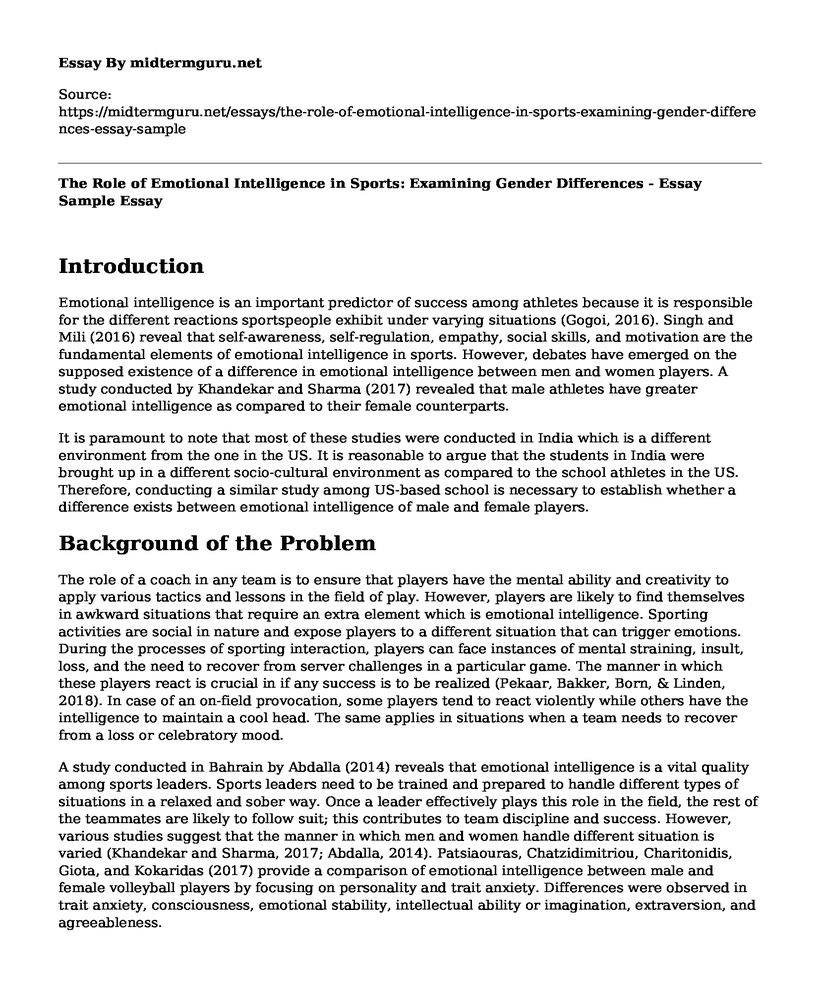Introduction
Emotional intelligence is an important predictor of success among athletes because it is responsible for the different reactions sportspeople exhibit under varying situations (Gogoi, 2016). Singh and Mili (2016) reveal that self-awareness, self-regulation, empathy, social skills, and motivation are the fundamental elements of emotional intelligence in sports. However, debates have emerged on the supposed existence of a difference in emotional intelligence between men and women players. A study conducted by Khandekar and Sharma (2017) revealed that male athletes have greater emotional intelligence as compared to their female counterparts.
It is paramount to note that most of these studies were conducted in India which is a different environment from the one in the US. It is reasonable to argue that the students in India were brought up in a different socio-cultural environment as compared to the school athletes in the US. Therefore, conducting a similar study among US-based school is necessary to establish whether a difference exists between emotional intelligence of male and female players.
Background of the Problem
The role of a coach in any team is to ensure that players have the mental ability and creativity to apply various tactics and lessons in the field of play. However, players are likely to find themselves in awkward situations that require an extra element which is emotional intelligence. Sporting activities are social in nature and expose players to a different situation that can trigger emotions. During the processes of sporting interaction, players can face instances of mental straining, insult, loss, and the need to recover from server challenges in a particular game. The manner in which these players react is crucial in if any success is to be realized (Pekaar, Bakker, Born, & Linden, 2018). In case of an on-field provocation, some players tend to react violently while others have the intelligence to maintain a cool head. The same applies in situations when a team needs to recover from a loss or celebratory mood.
A study conducted in Bahrain by Abdalla (2014) reveals that emotional intelligence is a vital quality among sports leaders. Sports leaders need to be trained and prepared to handle different types of situations in a relaxed and sober way. Once a leader effectively plays this role in the field, the rest of the teammates are likely to follow suit; this contributes to team discipline and success. However, various studies suggest that the manner in which men and women handle different situation is varied (Khandekar and Sharma, 2017; Abdalla, 2014). Patsiaouras, Chatzidimitriou, Charitonidis, Giota, and Kokaridas (2017) provide a comparison of emotional intelligence between male and female volleyball players by focusing on personality and trait anxiety. Differences were observed in trait anxiety, consciousness, emotional stability, intellectual ability or imagination, extraversion, and agreeableness.
Theoretical Foundation
In a social environment, women and men are expected to react and act differently which denotes a variation in the perceptions between the two categories. Many sociologists have focused on the topic of gender roles and expectation while psychologists have attempted to conduct studies on the existence of difference in the mental capacity and intelligence between man and women.
The study is informed by several theories that include:
- The five-factor theory provides five important areas that can be used to establish emotional intelligence which includes; trait anxiety, consciousness, emotional stability, intellectual ability or imagination, extraversion, and agreeableness
- Emotional intelligence is an important determinant of behavior and leadership
- The theory of social competence can be utilized to explain the behavior of people in a specific setting
- The theory of social information processing can reveal details regarding the emotional skills of people
References
Abdalla, L. (2014). The emotional intelligence and gender among sports leaders in Bahrain Kingdom- Comparative study. Science, Movement, and Health, 14(1), 110-115.
Gogoi, D. (2016). Comparison of emotional intelligence among selected team games. International Journal of Applied Research, 2(2), 18-19.
Khandekar, G., & Sharma, R. (2017). Investigation of emotional intelligence among university-level male and female players of Chhattisgarh. International Journal of Physical Education, Sports, and Health, 4(3), 376-378.
Patsiaouras, A., Chatzidimitriou, M., Charitonidis, K., Giota, A., & Kokaridas, D. (2017). The relationship of personality and trait anxiety between male and female volleyball players. Annals of Applied Sport Science, 5(3), 39-47,
Pekaar, K. A., Bakker, A. B., Born, M., & Linden, D. v. (2018). The consequences of self- and other-focused emotional intelligence: Not all sunshine and roses. Journal of Occupational Health Psychology. ,. http://dx.doi.org/10.1037/ocp0000134.
Singh, K. R., & Mili, A. (2016). Study of emotional intelligence among players of individual, dual and team sports. International Journal of Science and Research, 5(12), 1101-1106.
Cite this page
The Role of Emotional Intelligence in Sports: Examining Gender Differences - Essay Sample. (2023, Jan 23). Retrieved from https://midtermguru.com/essays/the-role-of-emotional-intelligence-in-sports-examining-gender-differences-essay-sample
If you are the original author of this essay and no longer wish to have it published on the midtermguru.com website, please click below to request its removal:
- Essay Sample on Revenge Porn
- Cultural Relativism & Morality: Comparing Rachels & Benedict - Essay Sample
- Teen Pregnancy: A Growing Dilemma in Society - Research Paper
- US Gun Ownership: High Restrictions, Highest Violence - Essay Sample
- Social Problems in the US: Gun Violence, Racism, and Drug Abuse - Essay Sample
- Social Cognition & Mental Disorder: Autism Spectrum Disorder - Essay Sample
- Critical Essay on Clothes by Chitra Banerjee Divakaruni







